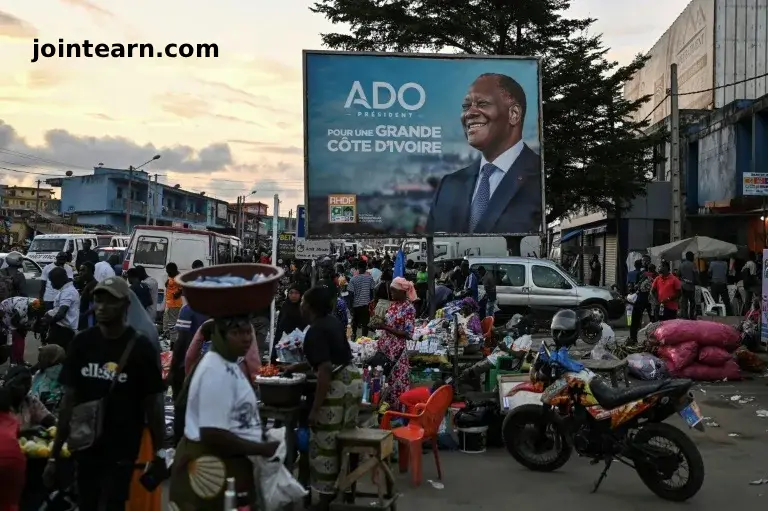
Ivorians are casting their votes in a high-stakes presidential election that could extend President Alassane Ouattara’s rule into a fourth term, cementing his position as one of West Africa’s longest-serving leaders. With key opposition figures barred from contesting, Ouattara’s path to victory appears clear — though tensions and sporadic violence threaten to overshadow the democratic process.
A Contested Election and a Weakened Opposition
Polling stations opened across Ivory Coast at 8:00 a.m. (0800 GMT) on Saturday, with nearly nine million registered voters. By late afternoon, lines formed in parts of Abidjan, the country’s bustling economic capital, as citizens sought to cast their ballots before polls closed at 6:00 p.m.
President Ouattara, 83, first took office in 2011 after a violent post-election crisis that left more than 3,000 people dead. Under his leadership, Ivory Coast — the world’s largest cocoa producer — has emerged as one of West Africa’s fastest-growing economies. However, critics argue that economic progress has been accompanied by increasing political exclusion and social inequality.
Among those excluded from this year’s race are former president Laurent Gbagbo and former Credit Suisse CEO Tidjane Thiam, both disqualified from running. Gbagbo’s criminal conviction and Thiam’s dual French nationality barred their candidacies, leading analysts like Gilles Yabi of the Wathi think tank to say, “It is hard to imagine any surprise at the end of this election.”
Rising Tensions and Security Concerns
Despite Ouattara’s apparent dominance, the election has been marred by tension and sporadic unrest. Over the past week, four people — including one police officer — have died in clashes between protesters and security forces. On Monday, an Independent Electoral Commission (CEI) building was torched, prompting authorities to ban demonstrations nationwide.
The government deployed 44,000 security personnel to safeguard polling stations, especially in the volatile southern and western regions — traditional opposition strongholds. A night-time curfew remains in effect in Yamoussoukro, the political capital, amid fears of further violence.
“We must be ready to protect Ivory Coast,” Ouattara urged supporters at his final rally in Abidjan. “The election is frightening, but we dare to believe there will be more fear than harm,” said Ibrahime Kuibiert Coulibaly, head of the CEI.
Opposition Cries Foul
Former president Gbagbo condemned the poll as a “civilian coup d’état” and “electoral robbery,” claiming the disqualification of strong opponents undermines democracy. His party and that of Thiam have urged supporters to boycott or protest the election, creating uncertainty about voter turnout in historically opposition-aligned regions.
Analysts say participation levels in the south and west could be crucial to determining whether Ouattara secures a first-round victory or faces a run-off.
Fragmented Field of Rivals
In total, five candidates are running for the presidency, but none pose a serious challenge to Ouattara’s ruling Rally of Houphouëtists for Democracy and Peace (RHDP).
Among the contenders:
- Jean-Louis Billon (60) – former trade minister and businessman, representing a faction of the Democratic Party.
- Simone Ehivet Gbagbo (76) – former first lady and prominent left-wing figure, vying for her ex-husband’s loyal base.
- Ahoua Don Mello – independent Pan-Africanist with pro-Russian sympathies.
- Henriette Lagou – centrist and one-time 2015 presidential candidate, who previously won less than 1% of the vote.
Ouattara’s administration points to years of robust economic growth, improved infrastructure, and relative stability following the turmoil of 2010–2011. However, opposition groups argue that benefits of development remain uneven, with high unemployment and rising living costs disproportionately affecting ordinary citizens.
Avoiding a Repeat of 2020’s Violence
Authorities insist that this election will not repeat the deadly unrest of 2020, when 85 people died during protests over Ouattara’s controversial third-term bid. Officials say the extensive deployment of security forces is meant to prevent chaos rather than stifle dissent.
Still, civil society leaders warn that suppressing demonstrations could deepen divisions. “Ivory Coast needs reconciliation, not repression,” said an observer from the local NGO Citoyens Pour la Paix.
Regional and International Observers
More than 1,000 election observers — including 251 representatives from ECOWAS and the African Union — are monitoring Saturday’s vote to ensure transparency and credibility. Early results are expected next week, though the political climate remains tense.
As the ballots are counted, Ivorians wait anxiously to see whether Ouattara’s expected victory will bring stability or trigger a new wave of unrest in a country still healing from past electoral conflicts.


Leave a Reply